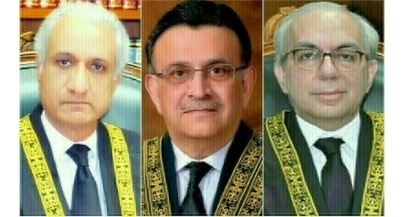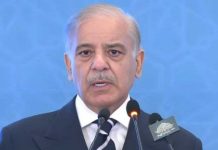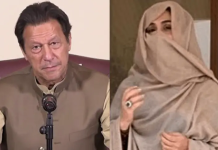ISLAMABAD, JUN 7: A three-member bench of the Supreme Court (SC) on Wednesday clubbed together pleas against the recently-enacted Supreme Court (Review of Judgments and Orders) Act 2023 with the Election Commission of Pakistan’s (ECP) petition asking the top court to revisit its April 4 order of holding polls to the Punjab Assembly on May 14.
The decision was taken as the bench — comprising Chief Justice of Pakistan (CJP) Umar Ata Bandial, Justice Ijazul Ahsan and Justice Munib Akhtar — took up the ECP’s review petition.
At the previous hearing, Attorney General for Pakistan (AGP) Mansoor Usman Awan had surprised judges by disclosing that fresh legislation, which expanded the jurisdiction of the court by giving a right to appeal under Article 184(3), had come into force.
Article 184(3) of the Constitution grants the SC powers to issue an order if it considers a question of public importance with reference to the enforcement of fundamental rights involved.
According to the Supreme Court (Review of Judgments and Orders) Act 2023, the scope of a review will be similar to Article 185, which confers appellate jurisdiction to the top court.
Upon the AGP’s revelation, the SC had adjourned proceedings on the ECP’s petition, saying the new law would be discussed in court.
During today’s hearing, CJP Bandial remarked that a number of pleas against the new law had been filed with the top court and decided to hear them alongside the ECP’s review petition.
He also issued notices to the federal government, AGP Awan, the president through the principal secretary, Ministry for Parliamentary Affairs and Secretariat Senate. The hearing was adjourned till June 13.
The hearing
At the outset of the hearing, the bench called PTI lawyer Barrister Ali Zafar to the rostrum and asked about his stance on the review of judgments law.
“The new law is inconsistent with the Constitution and is a continuation of the Supreme Court (Practice and Procedure) Act, 2023,” the lawyer said.
Zafar also suggested that the SC should continue hearing the ECP’s review petition, saying he had prepared arguments in this regard.
“The court can simultaneously also hear pleas against the review of judgments law. If the review point persists, a larger bench can be constituted,” he added.
Here, Justice Bandial remarked that the court had to look at the law at one point or the other.
Meanwhile, Justice Akhtar observed that if the review law was applicable to the ECP’s petition, the electoral body’s lawyer would have to again present his arguments before a larger bench.
“How can the court continue hearing the Punjab polls case if the Supreme Court (Review of Judgments and Orders) Act 2023 has come into force? Is the new law not applicable to this case? Do you think the ECP’s petition should be heard as per the old law?” the judge asked Zafar.
The PTI lawyer replied that the case should, at the moment, be heard according to the old laws.
“This is not a brand new case,” Justice Bandial said. “This is an appeal against a decision that was taken previously and appeals have several limitations.”
The top judge noted that a lot of time had passed in hearing arguments and recalled that the ECP lawyer had already presented his argument on the scope of a review. “If the matter goes to a larger bench, arguments will have to be heard once again.”
“This matter is linked to a national issue,” Justice Bandial observed. “Our decision regarding [polls on] May 14 cannot be withdrawn. Elections in 90 days is a constitutional requirement.
“Everyone agrees with the Constitution, but not everyone is clear on enforcing the Constitution,” he said.
The top judge further pointed out that the ECP had given the date of October 8 for polls but then said the situation had changed due to the events of May 9 — when protests had erupted across the country following PTI chief Imran Khan’s arrest.
“The ECP should have the ability to hold elections in any circumstances,” he remarked.
At one point during the hearing, Justice Bandial said it was good that the government and institutions had decided to present their arguments in court.
“They were otherwise protesting at the gate of the court,” he recalled, referring to the Pakistan Democratic Movement’s sit-in outside the top court last month.
“What was the purpose of that protest?” the CJP asked. “The responsibility of dispensing justice is of Maula Karim [God],” he said, adding that the court was striving to ensure the rights of the people and those who interfered in this would suffer “dire consequences”.
At one point, Barrister Zafar put forward a request before the court and asked the bench to decide the ECP’s petition. “Five judges […] seven judges […] they are playing mathematics,” he contended.
The lawyer reiterated that the review of judgments law was unconstitutional. “I had objected to it in the Senate too […] If you want to bring changes to the law, do it through amendments,” he said.
Here, CJP Bandial asked, “Are you trying to say that the appeal was given a new name under a new law?”
The PTI counsel replied that the scope of review and appeal were separate under the law. “But the review was turned into an appeal by going against the Constitution,” he said.
The top judge stated the law had been restricted to Article 184(3) of the Constitution.
Subsequently, the court adjourned the hearing till June 13.
Barrister Zafar hopeful of Constitution’s ‘victory’
Speaking to the media outside the court, Barrister Zafar emphasised that the Constitution stipulated the obligation to hold elections within 90 days following the dissolution of an assembly.
Despite the Supreme Court’s directive, the scheduled elections in Punjab on May 14 did not take place, he added.
Zafar pointed out that the Constitution was deemed ineffective in Punjab.
Regarding the Supreme Court’s decision on polls, he said the ECP filed a petition for a review, alongside other pleas submitted under the Supreme Court (Review of Judgements and Orders) Act 2023.
Zafar further stated that notices were issued to the attorney general and other parties involved. The next hearing of the case is scheduled for next Tuesday.
He expressed optimism, affirming that victory would be in favour of the Constitution.

















